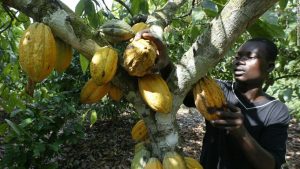
Accra, August 3, 2017//-Ghana Cocoa Board (COCOBOD), the government-controlled institution that encourages and facilitates the production, processing and marketing of good quality cocoa in Ghana, the world’s second largest producer of the commodity, says it is promoting irrigation among cocoa farmers as climate change and associated harsh weather conditions threaten the survival of the cocoa industry.
According to the country’s Minister of Finance, Ken Ofori-Atta, irrigation has the potential to increase cocoa production from the current 830,000 tonnes per annum to more than 1 million tonnes per annum, within the next four years in the country.
To this end, he said: ” Irrigation systems are being set up around the cocoa stations and piloted on cocoa farms around the cocoa stations for effective monitoring and evaluation.
Private sector companies with experience in irrigation in cocoa farms are leading the process with close collaboration of Cocoa Health and Extension Division (CHED) and Seed Production Division (SPD)”.
Additionally, the Ghana Cocoa Board has rolled out the artificial pollination programmes which are aimed at increasing productivity of cocoa farmers from an average yield of 450kg/ha to over 1,000kg/ha. “COCOBOD has trained and deployed 10,000 hand pollinators to assist farmers. It is projected that 24,000 hectares of farms will be pollinated in 2017 with an expected increase to 30,000 hectares in the next three years”, Mr Ofori-Atta told Parliament recently.
These are some of the initiatives that the current government is putting in place to turn the country’s cocoa industry. It is the objective of the government to reverse this declining trend and increase production to more than 1 million tonnes per annum, within the next four years, according to him.
Ghana’s cocoa output, which was over 1 million tonnes in 2010/11 crop year, declined to an average figure of 830,000 tonnes per annum in the past five years.
In light of estimated 22 percent of the country’s current cocoa tree stocks classified as over-aged/moribund or CSSVD infected, COCOBOD with support from government continued the Cocoa Rehabilitation Programme, the minister said.
COCOBOD also reformed the Mass Cocoa Spraying to involve greater private sector participation and farmer ownership.
Ghana and Côte d’Ivoire produce about 60 percent of the world’s cocoa and face common challenges in production and marketing of the beans. The individual country specific solutions are not sufficient to remedy these challenges.
Under the determined leadership of Nana Addo Dankwa Akufo-Addo and his Ivorian counterpart, the Ghana-Côte d’Ivoire Cooperation has been renewed and energized leading to a meeting in April 2017 in Abidjan and followed by a second meeting in Accra in June 2017.
The meetings 26 have set out the framework of the cooperation and worked out details of its implementation. The implemented decisions and initial successes so far include a common strategy, anti-smuggling initiative, a funding arrangement to undertake critical projects in both countries, increasing use of cocoa butter equivalent (CBEs) and formation of a new producer organization.
The agricultural sector is said to be a major contributor to Ghana’s economy, contributing about 45 percent to the country’s Gross Domestic Product (GDP), with cocoa alone producing almost 25 percent of this total amount.
More than 70 percent of the cocoa produced in Ghana is exported to Europe and America, with the remaining 25 percent processed in the country into other bi-products such as chocolate, liquor, soap, body cream and other confectionaries like milo and other products.
By Masahudu Ankiilu Kunateh, African Eye Report
.


